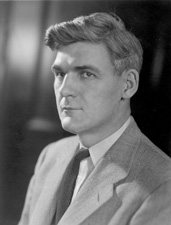| Preceded by Ernest Lundeen Preceded by Arthur E. Nelson |
Joseph H. Ball US Senator (Class 2) from Minnesota[1] 1940—1942US Senator (Class 2) from Minnesota 1943—1949 |
Succeeded by Arthur E. Nelson Succeeded by Hubert Humphrey |
Biography
Copied from Wikipedia:
Joseph Hurst Ball (November 3, 1905 – December 18, 1993) was an American journalist, politician and businessman. Ball served as a Republican senator from Minnesota from 1940 to 1949. He was a conservative in domestic policy and a leading foe of labor unions. He helped draft the Taft-Hartley Act of 1947. Ball was best known for his internationalism and his support for a postwar world organization, that became the United Nations. However, after 1945 he was an opponent of the Marshall Plan.
When Senator Ernest Lundeen, an isolationist, was killed in a plane crash, Stassen appointed Ball to fill the remaining two years of Lundeen's term. One of the youngest persons ever to become a U.S. senator, Ball, at thirty-five, was also the first senator to be required to register for conscription.[3] After being sworn in on October 14, 1940, Ball stunned isolationist Republicans in his first speech on the Senate floor, calling for the United States to aid Britain as "a barrier between us and whatever designs Hitler and his allies may have on this continent".[2]
He opposed the liberalism of the New Deal, but he supported Franklin Roosevelt's foreign policy and supported the Lend-Lease program on March 8, 1941, in spite of overwhelmingly negative letters from his constituents. The change in sentiment was best illustrated by the editorial pages of the Fairmont Daily Sentinel, as quoted in an article in The New Republic. When he had first been appointed, the Sentinel ran an editorial with the headline, "Joe Ball for U.S. Senator! Good God!"; upon Ball's re-election, the Sentinel ran another editorial entitled "Joe Ball for U.S. Senator! Thank God!"[2]
Ball was elected to the Senate in the 1942 election, receiving 47% of the vote against Farmer-Labor, Independent and Democratic opposition. Because Ball's 1940 appointment had been set to expire on the day of the next senatorial election rather than the expiration of Lundeen's term, Ball ceased being senator on the day that he won a six-year term. Ball then took office again, as a freshman senator on January 3, 1943, and served until January 3, 1949. In 1943, he was one of four Senate sponsors of the bill to establish what would become the United Nations.
In the 1944 U.S. presidential election, Ball refused to support Republican nominee Thomas E. Dewey, the governor of New York, and instead crossed party lines to endorse Franklin Roosevelt. Ball denounced Dewey for making his position on foreign policy so unclear that both isolationists and internationalists "could find comfort and support in what he said".[4] Ball's support for Roosevelt, which may have proved critical to victory in Minnesota, won praise from his senatorial colleague Carl Hatch, a New Mexico Democrat, who said that Ball had "placed his country above his party".[4]
In 1948, Ball was soundly defeated for Senate reelection by Mayor Hubert H. Humphrey of Minneapolis, a 37-year-old liberal Democrat and civil rights advocate.
During the 1950s, Ball came to the public defense of several people whom Senator Joseph R. McCarthy accused of having Communist leanings.[5]
Ball had never stopped writing his column for the Pioneer Press, even during his service in the United States Senate. He therefore returned to the news business and continued to comment on American foreign policy in a newsletter. He worked as an executive in the shipping industry until he retired in 1982, four years after the death of Hubert Humphrey. Ball died in Chevy Chase, Maryland, at the age of 88. [His grave is in Prospect Hill Cemetery, Front Royal, VA.]
Birth Certificate
Ball, Joseph Hurst
Birth Certificate Index
Certificate Number: 1905-20101
Birth: November 3, 1905
County of Birth: Polk County, Minnesota, United States
Subject: Birth records
Type: Text, Government Record, Historical Records
Mother's Maiden Name: Hurst
[1]
Sources
- ↑ Resigned when successor elected qualified, vacant November 3, 1942 – November 18, 1942.
- Find A Grave Memorial# 9326643
- Joseph H. Ball on Wikipedia
- Biographical Directory of the United States Congress
It may be possible to confirm family relationships. Maternal line mitochondrial DNA test-takers:
- Kathy Matlock
 :
Family Tree DNA mtDNA Test Full Sequence, haplogroup H23, FTDNA kit #361249
:
Family Tree DNA mtDNA Test Full Sequence, haplogroup H23, FTDNA kit #361249
-
~0.78%
 ~1.56%
Kathy Matlock
~1.56%
Kathy Matlock  :
23andMe, GEDmatch M886960 [compare]
+
AncestryDNA
+
Family Tree DNA Family Finder, GEDmatch DG5916480 [compare], FTDNA kit #361249
+
MyHeritage DNA
+
Living DNA
:
23andMe, GEDmatch M886960 [compare]
+
AncestryDNA
+
Family Tree DNA Family Finder, GEDmatch DG5916480 [compare], FTDNA kit #361249
+
MyHeritage DNA
+
Living DNA
-
~0.78%
L A Banta
 :
23andMe, GEDmatch TP5130525 [compare]
+
AncestryDNA, GEDmatch YA1012746 [compare]
+
MyHeritage DNA, GEDmatch ZT9904203 [compare]
:
23andMe, GEDmatch TP5130525 [compare]
+
AncestryDNA, GEDmatch YA1012746 [compare]
+
MyHeritage DNA, GEDmatch ZT9904203 [compare]
-
~0.39%
Shannon Dean
 :
AncestryDNA
:
AncestryDNA
Rejected matches › Joseph Weldon Bailey (1907-1994)
Featured Eurovision connections: Joseph is 32 degrees from Agnetha Fältskog, 26 degrees from Anni-Frid Synni Reuß, 26 degrees from Corry Brokken, 21 degrees from Céline Dion, 26 degrees from Françoise Dorin, 28 degrees from France Gall, 26 degrees from Lulu Kennedy-Cairns, 26 degrees from Lill-Babs Svensson, 21 degrees from Olivia Newton-John, 33 degrees from Henriette Nanette Paërl, 33 degrees from Annie Schmidt and 22 degrees from Moira Kennedy on our single family tree. Login to see how you relate to 33 million family members.




